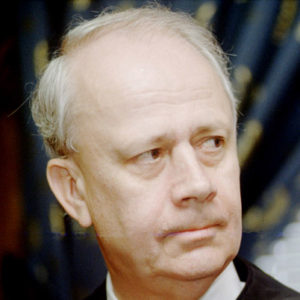calsfoundation@cals.org
Richard Sheppard Arnold (1936–2004)
Richard Sheppard Arnold served on the U.S. Court of Appeals for the Eighth Circuit (which includes Arkansas) for twenty-four years, including seven years as the court’s chief judge. Widely considered a top candidate for nomination to the U.S. Supreme Court, Arnold narrowly missed appointments in 1993 and 1994. President Bill Clinton attributed his selection of other candidates to concerns about Arnold’s health.
Richard Arnold was born in Texarkana, Texas, on March 26, 1936, to Richard Lewis Arnold and Janet Sheppard Arnold. The family had long been prominent in legal and political circles. Arnold’s paternal grandfather, William Hendrick Arnold, founded Arnold and Arnold, the leading law firm of southern Arkansas. His maternal grandfather was Senator Morris Sheppard of Texas. Arnold was educated at Phillips Exeter Academy in New Hampshire and went on to study at Yale University, where he majored in Latin and Greek and graduated first in his class in 1957. At Harvard Law School, Arnold was a member of the Harvard Law Review and graduated first in his class in 1960.
Following a clerkship with Supreme Court justice William Brennan, Arnold practiced law at the Washington DC law firm of Covington & Burling before returning to Arkansas to practice law with the family firm. Arnold ran for Congress twice (in 1966 and 1972) but was unsuccessful. In 1978, after several years of service as chief legislative aide to Senator Dale Bumpers, Bumpers helped secure an appointment for Arnold to the federal district court in Arkansas. In 1980, Arnold received another federal judicial appointment, this time to the U.S. Court of Appeals for the Eighth Circuit, with headquarters in St. Louis, Missouri.
Arnold was among the leading judges of the nation. His career drew comparisons to that of the eminent Learned Hand of an earlier generation. Unusually for his time, Arnold held great appeal across political lines—both liberals and conservatives supported his rise to the U.S. Supreme Court. In 1994, more than 100 federal judges—nearly twenty percent of the entire federal judiciary—wrote to President Bill Clinton to endorse Arnold for the seat left vacant by Justice Harry Blackmun’s retirement. Concerned about Arnold’s health, President Clinton instead appointed Stephen Breyer, even though Clinton believed Arnold to be “the most brilliant man on the federal bench.” Arnold had been diagnosed with lymphoma while still in his thirties, and a recent course of treatment had raised some concerns about his potential longevity on the bench.
From conservative beginnings, Arnold reached decisions some characterized as liberal, and his lucid, powerful opinions made him a leader in civil liberties at the close of the twentieth century. Among his many notable judicial opinions, Arnold was known for a near-absolutism on First Amendment issues, where he left a vivid footprint on issues ranging from speech rights of religious groups, candidate access to televised debates, funding of a gay student organization at the University of Arkansas (UA) in Fayetteville (Washington County), and prosecutions for cross burning in Minnesota. He considered hundreds of appeals from people facing the death penalty.
For most of his judicial career, Arnold supervised the litigation over desegregation in the Little Rock (Pulaski County) public schools, the longest-running desegregation case in U.S. history. At several critical junctures, Arnold’s opinions for the Eighth Circuit shaped the resolution of the litigation. For his work in this area, a reporter noted that Arnold was “as well known to many Arkansans as they will ever know a federal judge.”
Together with his younger brother, Morris Sheppard Arnold, who was also appointed to the Eighth U.S. Circuit Court of Appeals, the two became the first brothers ever to serve together on the same federal court.
Richard Arnold died on September 23, 2004, in Rochester, Minnesota, of complications from treatment for lymphoma. He was survived by his wife, Kay Kelley Arnold, and two daughters from a previous marriage, Janet Sheppard Arnold Hart and Lydia Palmer Arnold Turnipseed.
Eight justices of the U.S. Supreme Court issued memorial statements, as did former president Bill Clinton and Senator Hillary Rodham Clinton, who said, “America has lost one of its greatest jurists, and we have lost a cherished friend.” Arnold is buried in Little Rock. The federal courthouse in Little Rock was renamed the Richard Sheppard Arnold United States Courthouse in 2003.
For additional information:
Brennan, William J., Jr. “A Tribute to Chief Judge Richard S. Arnold.” Minnesota Law Review 7 (1993): 1.
Frank, John P., and A. Leon Higginbotham Jr. “A Brief Biography of Judge Richard S. Arnold.” Minnesota Law Review 78 (1993): 5.
Garnett, Richard W. “Jaycees Reconsidered: Judge Richard S. Arnold and the Freedom of Association.” Arkansas Law Review 58 (2005): 587–609.
Michelman, Frank I. “Anastasoff and Remembrance.” Arkansas Law Review 58 (2005): 555–585.
Obituary of Richard Sheppard Arnold. New York Times, September 25, 2004. Online at http://www.nytimes.com/2004/09/25/obituaries/25arnold.html (accessed February 1, 2022).
Price, Polly J. Judge Richard Arnold: A Legacy of Justice on the Federal Bench. Amherst, NY: Prometheus Books, 2009.
Szakasits, Monika. “A Selected Bibliography of Judge Richard Sheppard Arnold’s Writings and Tributes to His Career and Life.” Arkansas Law Review 58 (2005): 663–677.
Wald, Patricia M. “Judge Arnold and Individual Rights.” Minnesota Law Review 78 (1993): 35.
Polly J. Price
Emory University School of Law
 Divergent Prosperity and the Arc of Reform, 1968–2022
Divergent Prosperity and the Arc of Reform, 1968–2022 Dodson v. Arkansas Activities Association
Dodson v. Arkansas Activities Association Richard Arnold
Richard Arnold  Richard Sheppard Arnold Courthouse
Richard Sheppard Arnold Courthouse 




Comments
No comments on this entry yet.